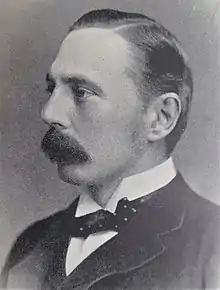Sir Robert Mowbray, 2nd Baronet
Sir Robert Gray Cornish Mowbray, 2nd Baronet, DL (21 May 1850 – 23 July 1916), was a British Conservative politician.
Sir Robert Mowbray | |
|---|---|
 Photograph of Sir Robert, c. 1895 | |
| Member of Parliament for Brixton | |
| In office 1900–1906 | |
| Preceded by | Abel Buckley |
| Succeeded by | Frederick Cawley |
| Member of Parliament for Prestwich | |
| In office 1886–1895 | |
| Preceded by | Evelyn Hubbard |
| Succeeded by | Joel Seaverns |
| Personal details | |
| Born | Robert Gray Cornish Mowbray 21 May 1850 |
| Died | 23 July 1916 (aged 66) |
| Political party | Conservative |
| Parents | Sir John Mowbray, 1st Baronet Elizabeth Grey Mowbray |
| Education | Eton College |
| Alma mater | Balliol College, Oxford |
Early life
Mowbray was the eldest son of the Father of the House of Commons, Sir John Mowbray, 1st Baronet, and his wife Elizabeth Grey (née Mowbray). Among his siblings were his younger brothers, Reginald Ambrose Mowbray, later the 3rd Baronet, and the Reverend Edmund George Lionel Mowbray, later the 4th Baronet.[1]
His paternal grandparents were Robert Stirling Cornish and the former Marianne Powning. His mother was the daughter, and sole heir, of George Isaac Mowbray of Bishopwearmouth and the former Elizabeth Gray.[1]
He was educated at Eton College before graduating from Balliol College, Oxford with a Master of Arts.[1]
Career
He was elected to Parliament for Prestwich at the 1886 general election, and held the seat until his defeat at the 1895 general election.[2] From 1887 til 1892 he was Parliamentary Private Secretary to George Goschen, Chancellor of the Exchequer. He returned to the House of Commons at an unopposed by-election in March 1900 for the Brixton constituency,[3][4] and held that seat until he stood down at the 1906 general election.[2] He lived at 'Warennes Wood' at Stratfield Mortimer in Berkshire and was appointed a deputy lieutenant of that county in 1900.[5]
He was a member of the Royal Commission on Opium in India from 1893 to 1895, and a member of the Royal Commission on Indian Expenditure in 1896.[1]
Personal life
Mowbray died, unmarried, in July 1916, aged 66.[1]
References
- Kidd, Charles, Williamson, David (editors). Debrett's Peerage and Baronetage (1990 edition). New York: St Martin's Press, 1990. pp. 620, 725, 770.
- Craig, F. W. S. (1989) [1974]. British parliamentary election results 1885–1918 (2nd ed.). Chichester: Parliamentary Research Services. pp. 29, 326. ISBN 0-900178-27-2.
- "No. 27175". The London Gazette. 20 March 1900. p. 1876.
- Mair, Robert Henry (1905). Debrett's House of Commons and the Judicial Bench. Dean and Son. Retrieved 8 September 2020.
- "No. 27193". The London Gazette. 18 May 1900. p. 3150.
External links
- Hansard 1803–2005: contributions in Parliament by Sir Robert Mowbray
- Leigh Rayment's baronetage page
- Mowbray, Sir Robert Gray Cornish (1850-1916) 2nd Baronet, barrister and politician at The National Archives
| Parliament of the United Kingdom | ||
|---|---|---|
| Preceded by Abel Buckley |
Member of Parliament for Prestwich 1886 – 1895 |
Succeeded by Frederick Cawley |
| Preceded by Evelyn Hubbard |
Member of Parliament for Brixton 1900 – 1906 |
Succeeded by Joel Seaverns |
| Baronetage of the United Kingdom | ||
| Preceded by John Robert Mowbray |
Baronet (of Warennes Wood) 1899 – 1916 |
Succeeded by Reginald Ambrose Mowbray |